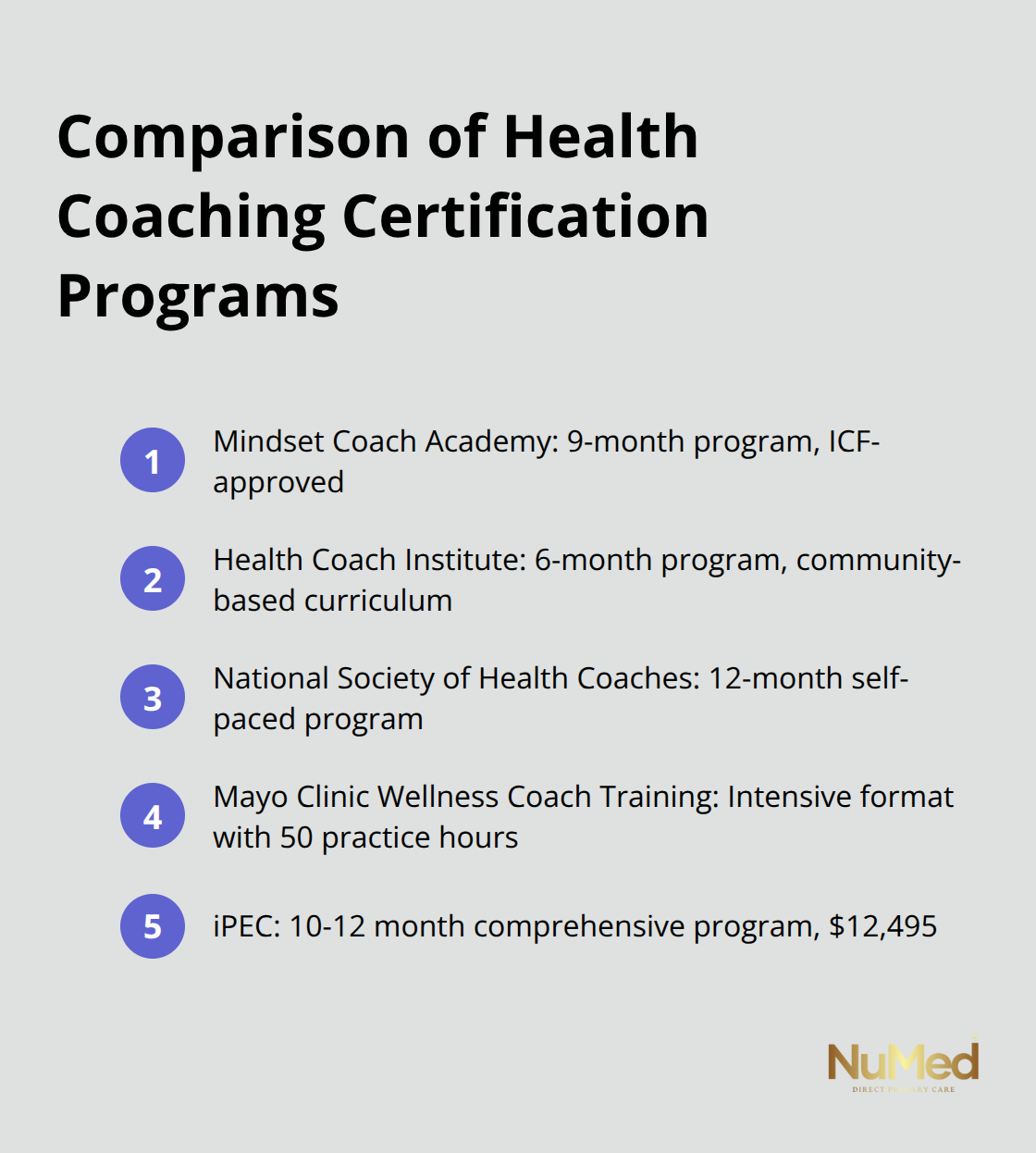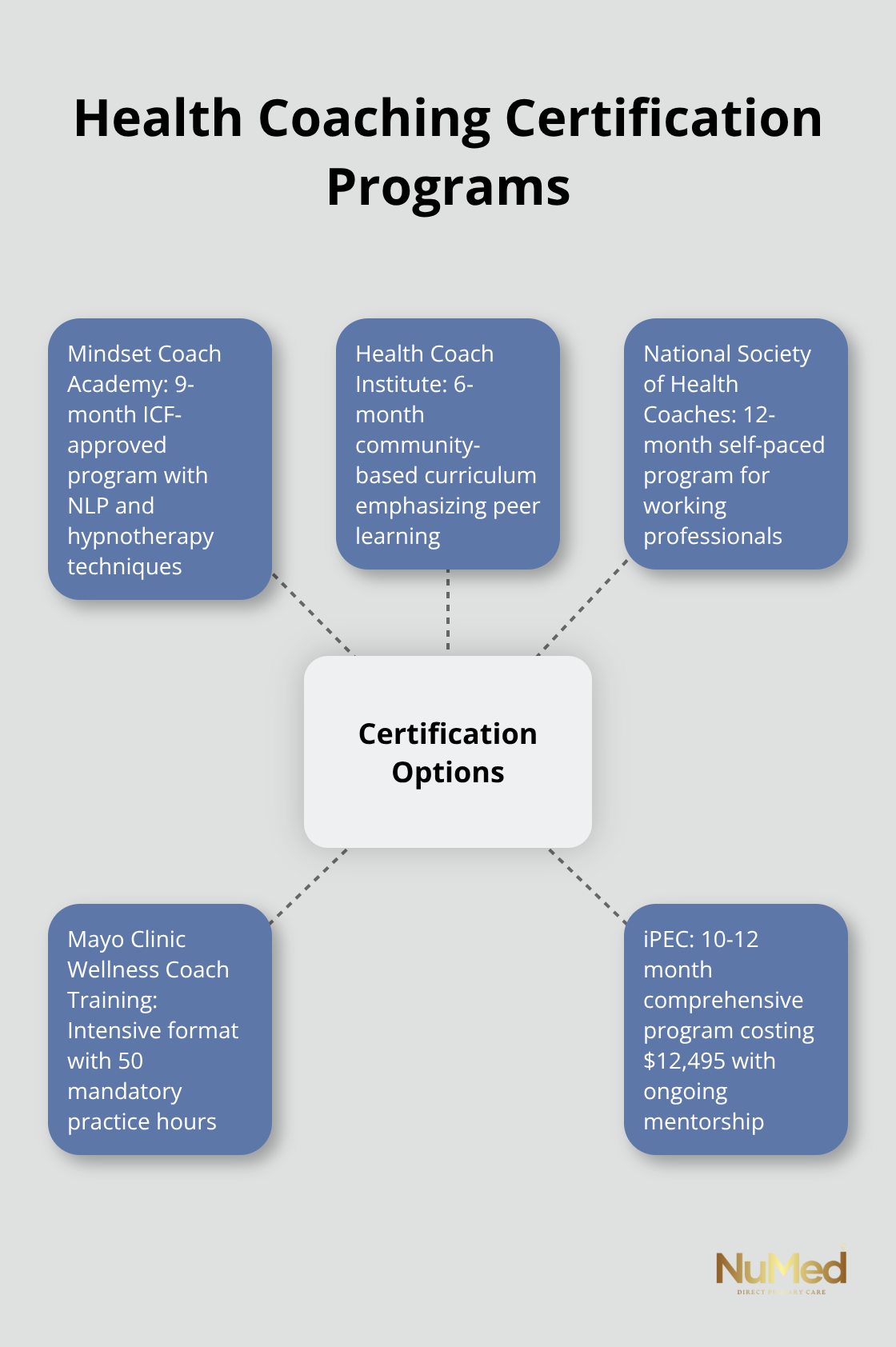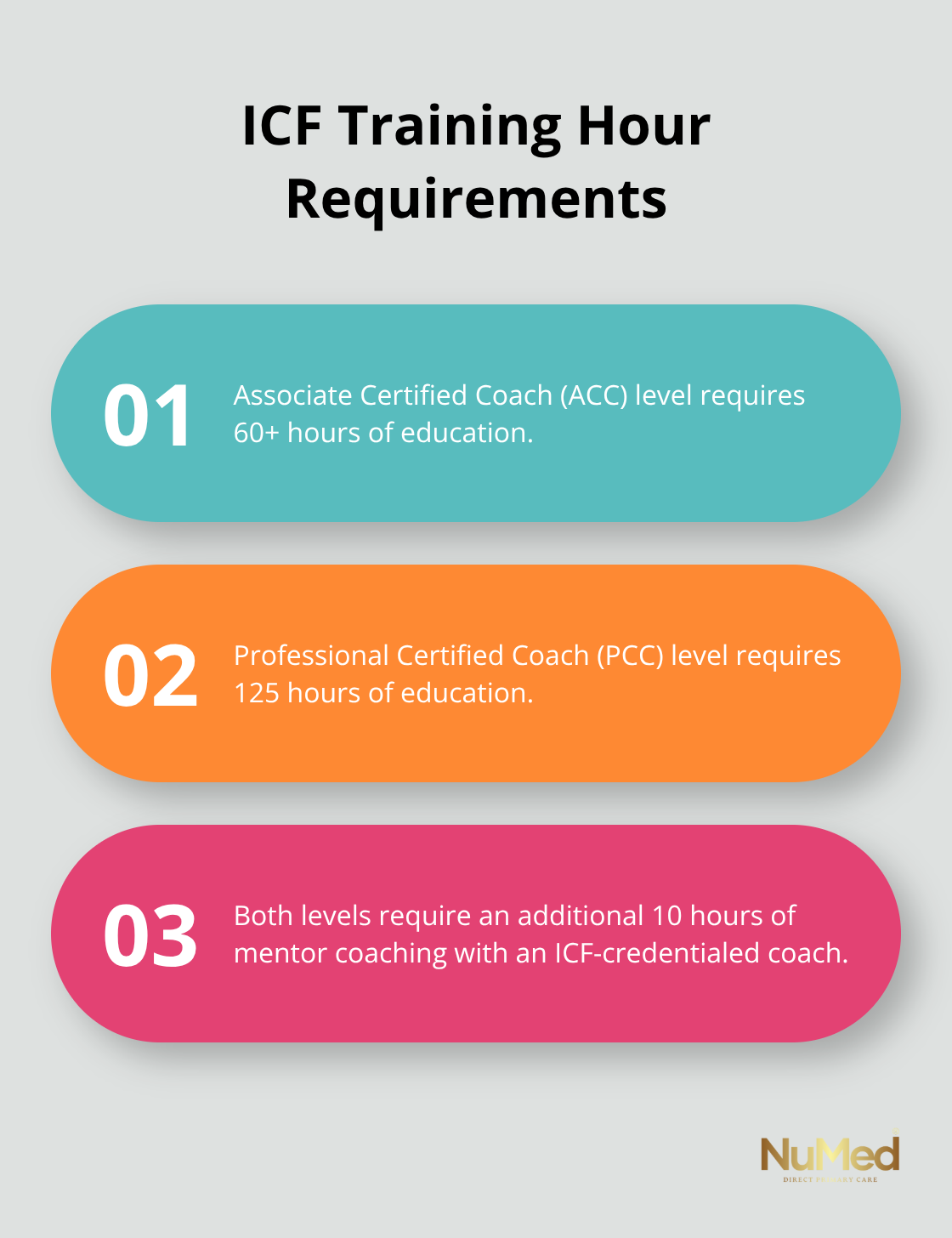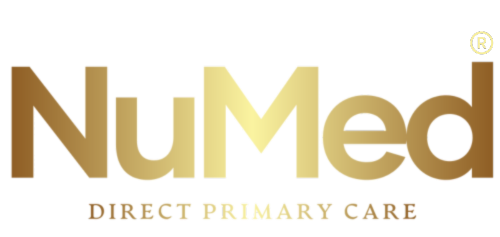Health mindset coaching certification opens doors to a rewarding career helping people transform their relationship with wellness. The demand for qualified health coaches has grown 67% over the past five years.

At NuMed DPC, we see firsthand how certified coaches make real differences in patient outcomes. This guide walks you through every step of earning your certification.
What Health Mindset Coaching Actually Involves
Health mindset coaching combines traditional health coaching with psychological techniques to address the mental barriers that prevent people from achieving wellness goals. Coaches work with clients to identify limiting beliefs around food, exercise, and self-care while they develop actionable strategies for sustainable behavior change. Professional credentialing remains important for establishing trust and credibility with potential clients in this growing field.
Core Competencies That Matter Most
Successful health mindset coaches master motivational interviewing techniques, cognitive behavioral strategies, and active listening skills. The Mayo Clinic Wellness Coach Training Program requires 50 practice hours post-training because hands-on experience proves more valuable than theoretical knowledge alone. Coaches must also understand basic nutrition science, stress physiology, and habit formation principles. The Health Coach Institute emphasizes community-based learning because peer interaction accelerates skill development faster than solo study methods.
Real Income Potential and Career Paths
Certified health mindset coaches earn between $30,000 to $70,000 annually according to Bureau of Labor Statistics data, with specialized coaches who command higher rates. New coaches typically charge $50-$100 per hour, while experienced practitioners earn $150-$300+ for specialized services. Corporate wellness programs, private practice, and healthcare partnerships offer the strongest revenue opportunities. The health coaching market is projected to reach $20.1 billion in 2025 and grow at 8.3% annually through 2034 as healthcare systems increasingly recognize coaching’s value.
Skills That Set You Apart
Top-performing coaches develop expertise in neuroscience-based techniques and behavioral change methods. They learn to identify subconscious patterns that sabotage client progress and apply specific interventions to overcome these obstacles. Many successful practitioners also gain certification in complementary areas like nutrition counseling or stress management to expand their service offerings and increase their market value.
With these foundational skills in place, the next step involves selecting a certification program that aligns with your career goals and learning preferences.
Which Certification Program Fits Your Goals
The International Coaching Federation remains the gold standard for coaching credentials, with ICF-accredited programs commanding higher client rates and stronger market credibility. ICF requires 60 hours of training for Associate Certified Coach level, 125 hours for Professional Certified Coach, and includes mandatory mentor coaching sessions that accelerate your learning curve. The Mindset Coach Academy offers ICF-approved training combined with NLP and hypnotherapy techniques in its 9-month program, while the Health Coach Institute provides a 6-month community-based curriculum that emphasizes peer learning and business development skills.
Program Formats That Actually Work
Self-paced online programs like the National Society of Health Coaches’ 12-month certification work best for working professionals, while intensive formats like the Mayo Clinic’s program with mandatory 50 practice hours suit career changers who want faster market entry. Live virtual training sessions outperform recorded modules for skill development because real-time feedback corrects technique errors immediately. The Dr. Sears Wellness Institute offers hybrid formats that range from 6 to 12 weeks and combine online learning with practical application (giving you flexibility without sacrificing hands-on experience).
Investment Returns Worth Making
Certification costs range from $3,000 for focused programs like Kasey Orvidas’ Health Mindset Coaching Certification to $12,495 for comprehensive options like iPEC’s 10-12 month program. Higher-priced programs typically include ongoing mentorship, business training modules, and lifetime access to updated materials that justify their premium pricing. The Precision Nutrition Master Health Coaching Certification costs around $4,000 for their 20-week program but certified nutrition coaches earn average salaries between $45,500-$50,584. Payment plans reduce financial barriers (with most reputable programs offering 6-12 month installment options) that make quality training accessible without compromising your financial stability.

Specialized Focus Areas That Pay More
Health mindset coaches who specialize in specific areas command premium rates and attract more clients. The Health Mindset Coaching Certification by Kasey Orvidas targets health coaches, fitness trainers, and nutritionists who want to integrate mindset techniques into their practice. NASM, AFAA, and ACE approve this 12-week program that costs $3,000 with payment plans available. Corporate wellness coaching and addiction recovery coaching represent the highest-paying niches (with experienced specialists earning $200-$400 per session).
Once you identify the right program for your goals and budget, you’ll need to understand the specific steps required to complete your certification successfully.
How Do You Actually Complete Certification
Most reputable programs start with basic eligibility requirements that screen for commitment rather than extensive prerequisites. The Health Coach Institute requires a high school diploma and completion of their intake assessment, while ICF-accredited programs like iPEC demand a bachelor’s degree from any field. Application deadlines typically fall 30-60 days before program start dates, and competitive programs like the Mayo Clinic Wellness Coach Training fill their cohorts months in advance. Submit applications early because late submissions automatically go to wait lists regardless of qualifications.
Application Process and Prerequisites
Programs evaluate candidates through structured intake processes that assess readiness and commitment levels. The Mindset Coach Academy requires completion of a detailed application form plus a brief phone interview to determine program fit. Most certification bodies accept students from diverse educational backgrounds (healthcare professionals, fitness trainers, and career changers all qualify for admission). Documentation requirements include official transcripts, professional references, and signed commitment agreements that outline program expectations and completion timelines.
Training Hour Requirements
ICF standards mandate specific training hours that cannot be shortened or substituted: 60+ hours of education for ACC level, 125 hours for PCC level, plus 10 hours of mentor coaching with an ICF-credentialed coach. The Precision Nutrition program requires 20 weeks of active participation with weekly assignments that take 6-8 hours to complete properly. Live session attendance proves non-negotiable for most programs, with makeup sessions available only for documented emergencies. Programs like the National Society of Health Coaches allow self-paced completion but still require completion within 18 months to maintain enrollment status.

Assessment Standards and Examinations
Certification exams combine multiple-choice questions, practical demonstrations, and client session recordings that evaluators score against specific competency rubrics. The Health Mindset Coaching Certification by Kasey Orvidas requires three recorded coaching sessions with real clients plus a written case study analysis. ICF credentialing demands 100+ hours of coaching experience for the ACC level, with detailed logs that document session dates, duration, and client outcomes. Most programs allow two retake attempts for failed assessments, but additional attempts require payment of supplemental fees that range from $200-$500. Pass rates average 85-92% for students who complete all coursework and practice requirements, which makes preparation more important than natural talent for certification success.
Final Thoughts
Health mindset coaching certification transforms your ability to help clients overcome mental barriers that prevent wellness changes. Certified coaches earn $30,000-$70,000 annually while they make meaningful impacts on people’s lives through evidence-based techniques. Document client outcomes and collect testimonials that demonstrate your effectiveness after you complete your certification.
Focus on specific niches like corporate wellness or stress management to build a sustainable practice. Start with reduced rates while you develop your skills and reputation in the marketplace. Many successful coaches gain experience through pro bono sessions and volunteer opportunities (which accelerate skill development faster than theoretical study alone).
We at NuMed DPC support comprehensive wellness approaches that address both physical and mental health aspects through our direct primary care model. Network with healthcare professionals and wellness practitioners who can provide referrals to grow your client base. The health coaching market continues to expand as more people recognize the connection between mindset and physical wellness.
















